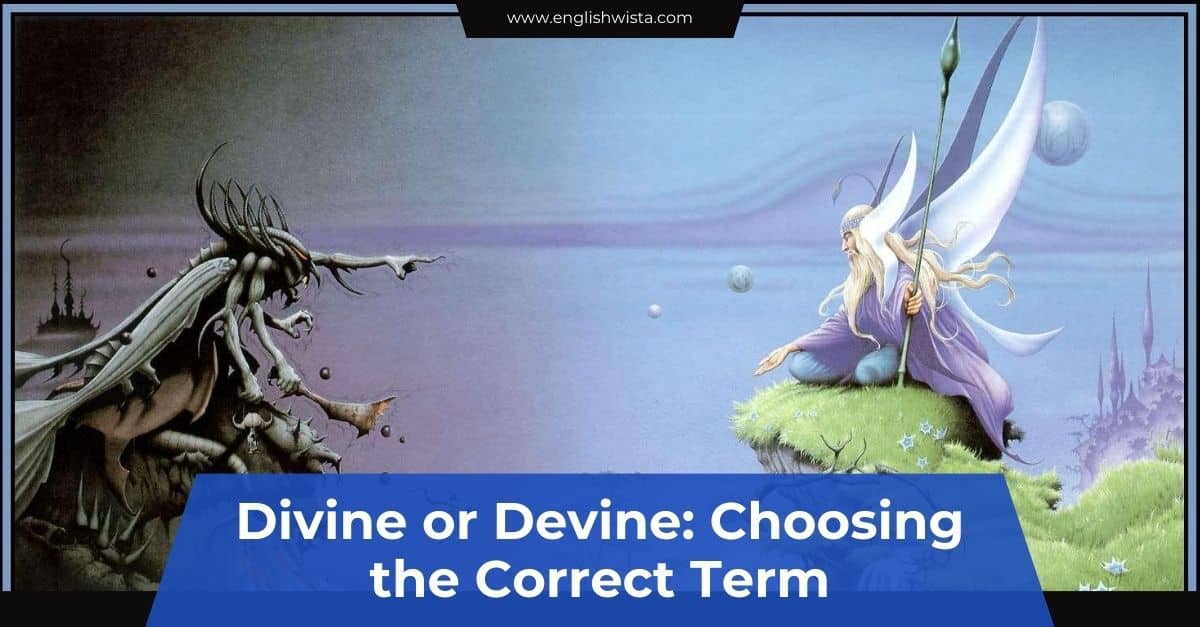Divine or Devine—two words that might seem similar but hold entirely different meanings. Have you ever stumbled upon them and wondered if they’re interchangeable or if one has a deeper connection to something spiritual, extraordinary, or even personal? You’re not alone. These terms often spark curiosity and invite a closer look at their origins and significance.
In this article, you’ll uncover the subtle yet profound differences between “divine,” with its heavenly connotations, and “Devine,” a name that carries its own charm. Get ready to explore fascinating stories, rich meanings, and practical insights that’ll leave you feeling both enlightened and entertained!
What Does “Divine” Mean?
“Divine” is an adjective that refers to something related to God, the heavens, or anything supremely wonderful. It can also be used as a verb, meaning to predict or discover something.
Here’s a simple definition: “Divine” describes something heavenly, godlike, or exceptionally good.
Examples of “Divine” in Sentences
- The sunset over the ocean was absolutely divine.
- Many ancient cultures believed priests could divine the future by studying the stars.
- The chocolate cake tasted so divine that I had to ask for the recipe.
Key Takeaway
If you’re describing something heavenly or fantastic, or if you’re talking about predicting something, “divine” is the word you want.
What About “Devine”?
“Devine” is actually a misspelling of “divine” in most cases. However, it is also a surname. For example, the famous actor Andy Devine carried this name.
Examples of “Devine” in Context
- Andy Devine was known for his distinctive raspy voice.
- If your last name is Devine, it’s just a family name, not the word that means “heavenly.”
Key Takeaway
Unless you’re referring to someone’s last name, “devine” is likely a typo. Always double-check to ensure you’re using the correct term.
Why Is It Easy to Confuse Them?
The main reason these words are often mixed up is that they sound the same when spoken. This is called a homophone—words that sound identical but have different meanings and spellings.
Quick Tip to Avoid Confusion
- Think of “divine” as something dazzling and related to divinity.
- Remember that “devine” is usually a last name, like a signature on a piece of art.
Common Questions About “Divine” and “Devine”
1. Is “Divine” Singular or Plural?
“Divine” is singular, but it can describe multiple things when used as an adjective. For example:
- Singular: The experience was divine.
- Plural: The desserts were all divine.
2. Can “Divine” Be a Noun?
Yes! Although less common, “divine” can be used as a noun to refer to a theologian or clergyman. For instance:
- The divines of the church gathered to discuss spiritual matters.
Real-Life Examples to Practice
Let’s see some examples to test your understanding:
- The choir’s harmony was absolutely ___ (divine/devine).
- Answer: divine
- My friend’s last name is ___ (divine/devine).
- Answer: devine
- The fortune teller claimed she could ___ (divine/devine) my future.
- Answer: divine
Fun Facts About “Divine”
- Word Origin: The word “divine” comes from the Latin word divinus, meaning “pertaining to a god.”
- Shakespeare’s Usage: William Shakespeare frequently used “divine” in his plays to describe characters or events with a heavenly quality.
- Related Words: Other words related to “divine” include “divinity” (the state of being divine) and “divination” (the practice of seeking knowledge through supernatural means).
Summary: Divine or Devine?
- Use divine for anything godlike, heavenly, or exceptionally good.
- Use devine as a proper noun, typically for a last name.
- If you’re unsure, “divine” is almost always the correct choice.
Conclusion: Now You’ve Got It!
Choosing between “divine” and “devine” doesn’t have to be tricky. Remember the key differences we’ve covered, and you’ll never mix them up again. Whether you’re describing a breathtaking experience or referring to someone’s surname, you now know which word to use. So go ahead and sprinkle some “divine” wisdom into your writing—it’ll be heavenly!



